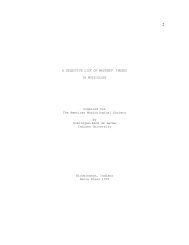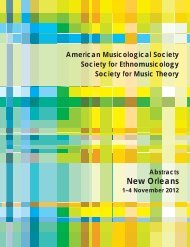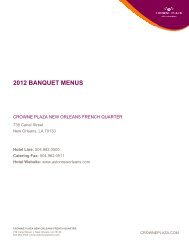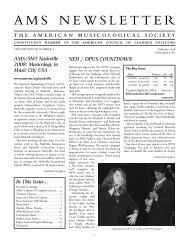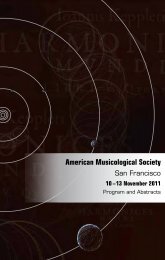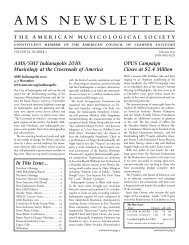AMS Philadelphia 2009 Abstracts - American Musicological Society
AMS Philadelphia 2009 Abstracts - American Musicological Society
AMS Philadelphia 2009 Abstracts - American Musicological Society
Create successful ePaper yourself
Turn your PDF publications into a flip-book with our unique Google optimized e-Paper software.
136 saturday afternoon <strong>AMS</strong> <strong>Philadelphia</strong> <strong>2009</strong><br />
tenacious innovator, who revered tradition as well as experimental techniques. He also placed<br />
a strong emphasis on the practical application of new ideas in addition to their theoretical<br />
development. These traits, which made Cowell the ideal candidate to disseminate the compositional<br />
practice from the late 1910s through the late 1950s, challenge current scholarly<br />
depictions of the composer as an undisciplined bohemian.<br />
THE COMPOSER AS WAR CORRESPONDENT:<br />
ModerN MUSiC DURING WORLD WAR II<br />
Beth E. Levy<br />
University of California, Davis<br />
In September of 1944, Minna Lederman wrote to Aaron Copland, “News from Europe is<br />
all that people want right now.” Her words are noteworthy in part because they show her in<br />
editorial command of the cadre of <strong>American</strong> composer-critics (including Henry Cowell and<br />
Virgil Thomson) who manned the journal Modern Music, active in New York from 1924 to<br />
1946. More remarkable still is the type of “news” that Lederman had in mind—not critical<br />
reportage on Parisian premieres or analysis of the latest Viennese stylistic trends, but news of<br />
the most baldly political sort: the latest edicts from Hitler’s Germany, accounts of <strong>American</strong><br />
soldiers “from the front,” and human interest stories from occupied France. On Lederman’s<br />
wish list were reports from “London, Paris, Rome and any other place you can think of that’s<br />
being what we call liberated. . . . If we could only have from all those countries and eventually<br />
Germany and Austria a story of music under the swastika!” Lederman got what she wanted.<br />
With regular columnists stationed in major European capitals, Modern Music was well positioned<br />
to cover the conflict. In the process, however, the journal was radically transformed in<br />
ways that even Lederman may not have foreseen.<br />
Through close reading of Modern Music and broader engagement with the cultural histories<br />
of the 1930s and ’40s, this paper will explore three such transformations. Most striking is the<br />
sheer volume and powerful framing of war news, including articles with dramatic titles like<br />
“Suicide in Vienna.” Recent emigrés chose to contribute under pseudonyms like “Fugitivus”<br />
or “X-1941” in order to protect their associates. The journal’s readers knew precisely when it<br />
became unsafe to have a Jewish wife under the Third Reich, and just how difficult it was for<br />
Germaine Tailleferre to find both staff paper and food as the war unfolded. Lederman also<br />
sought to capture the experiences of the many musician-soldiers who found themselves on<br />
the European front. Perhaps unintentionally, such coverage quickly broadened the stylistic<br />
scope of the journal, which began to cover band music, radio arrangements of swing, and<br />
surveys of favorite army entertainments. The journal’s newly patriotic tone is proclaimed in<br />
stars-and-stripes advertisements preserved at the Library of Congress: “music is a weapon of<br />
modern war!” In my view the most far reaching side effect of Modern Music’s wartime coverage<br />
involved the treatment of racial and national categories by <strong>American</strong> music critics. Horrified<br />
by the Aryanism of Nazi Germany and its attendant politicization of musical style, <strong>American</strong><br />
critics became much more squeamish in their own references to typically “Jewish” traits, the<br />
influence of “Latin blood,” or the musical habits of the Anglo-Saxon “race soul.” The demise<br />
of the journal in 1946 makes it impossible to say whether its attention to popular music and<br />
current events would have survived a transition to peacetime journalism. But the trenchant<br />
attacks it published on the evils of “nationalism” (by Roger Sessions, Alfred Einstein, and



